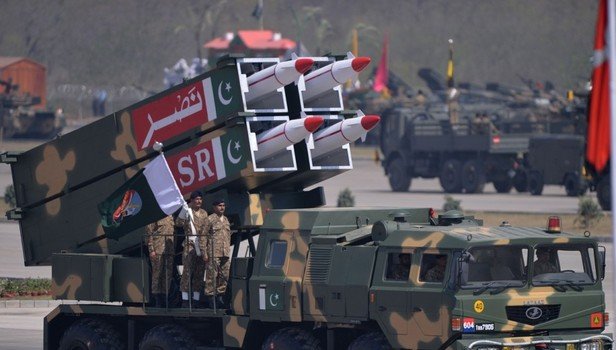China provides tracking system for Pakistan’s missile programme
23 Mar 2018 ( News Bureau )
China has sold Pakistan a powerful tracking system in an unprecedented deal that could speed up the Pakistani military’s development of multi-warhead missiles.
News of the sale - and evidence that China is supporting Pakistan’s rapidly developing missile programme - comes two months after India tested its most advanced nuclear-ready intercontinental ballistic missile (ICBM) with a range long enough to hit Beijing or Shanghai.
Chinese authorities declassified information about the deal on Wednesday.
A statement on the Chinese Academy of Sciences (CAS) website said China was the first country to export such sensitive equipment to Pakistan.
Zheng Mengwei, a researcher with the CAS Institute of Optics and Electronics in Chengdu, Sichuan province, confirmed to the South China Morning Post that Pakistan had bought a highly sophisticated, large-scale optical tracking and measurement system from China.
The Pakistani military recently deployed the Chinese-made system ''at a firing range'' for use in testing and developing its new missiles, he said.
India and Pakistan are in a heated race to build up their nuclear weapons capabilities.
India’s January 18 test of its Agni-V ICBM, with a range of more than 5,000km (3,100 miles), is seen as a message that the South Asian giant can deploy a credible nuclear deterrent against China.
While India’s single-warhead missiles are bigger and cover longer distances, Pakistan has focused its efforts on developing multiple independently targetable re-entry vehicles (MIRVs), a type of missile carrying several nuclear warheads that can be directed towards different targets.
The US Defence Intelligence Agency officially confirmed in March that Pakistan conducted the first test launch of its nuclear-capable Ababeel missile in January 2017, ''demonstrating South Asia’s first MIRV payload''.
Although the Ababeel missile has a range of only 2,200km, it can deliver numerous warheads to different targets. The technology has the potential to overwhelm a missile defence system, wiping out an adversary’s nuclear arsenal in one surprise attack.
There are growing concerns that MIRV technology will tip the strategic balance between India and Pakistan and destabilise the subcontinent.
India has so far not found success in building a system that can effectively deliver more than one nuclear warhead at a time.
But outside Pakistan, military experts believe that it will take much more time before the Ababeel missile is ready for use in battle. It is thought to be still at an early stage of development, with plenty of room for improvement.
It has been a long-held notion that Beijing is supporting Islamabad’s missile development programme. But solid evidence can seldom be found in the public domain, making the CAS statement a rarity.
The Chinese team enjoyed VIP treatment during the nearly three months it spent in Pakistan assembling and calibrating the tracking system and training technical staff on how to use it, according to the statement.
''The system’s performance surpassed the user’s expectations,'' it said, adding that it was considerably more complex than Pakistan’s home-made systems. It did not reveal how much Pakistan paid for the system.
(Click here for Android APP of IBTN. You can follow us on facebook and Twitter)
Share This News
About sharing
-
 18 May 2024
After Pakistan, India issues instructions for Indian students living in Kyrgyzstan
18 May 2024
After Pakistan, India issues instructions for Indian students living in Kyrgyzstan
After Pakistan, India issues instructions for Indian students living in Kyrgyzstan<...
-
 20 Apr 2024
Iraqi army claims major explosion at a base south of Baghdad
20 Apr 2024
Iraqi army claims major explosion at a base south of Baghdad
Iraqi army claims major explosion at a base south of Baghdad
Sat...
-
 19 Apr 2024
What did Iranian media say about Israel's attack?
19 Apr 2024
What did Iranian media say about Israel's attack?
What did Iranian media say about Israel's attack?
Friday, Ap...
-
 19 Apr 2024
What did the US Secretary of State say about Israel's attack on Iran?
19 Apr 2024
What did the US Secretary of State say about Israel's attack on Iran?
What did the US Secretary of State say about Israel's attack on Iran?<...
-
 19 Apr 2024
Iran-Israel tension: US bans travel of its consular staff to Israel
19 Apr 2024
Iran-Israel tension: US bans travel of its consular staff to Israel
Australia instructs its citizens to leave Israel amid Iran-Israel tension<...


